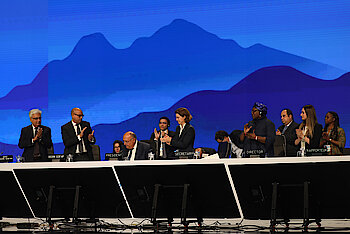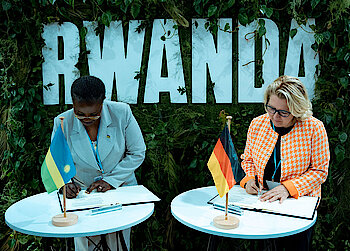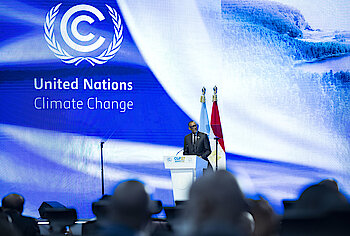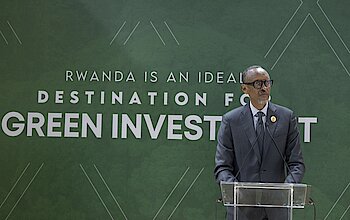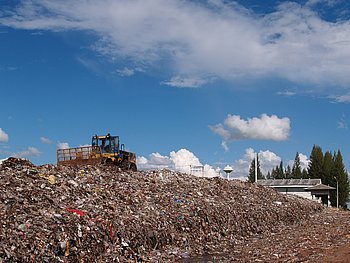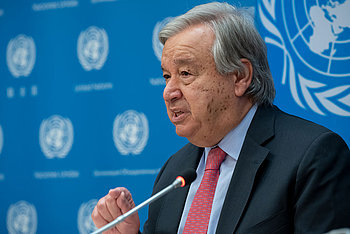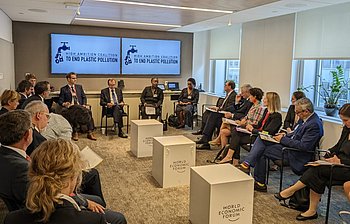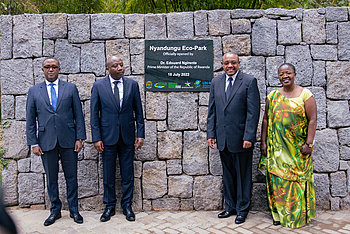
Strengthening Transparency in Climate Action: Rwanda's Progress under the Enhanced Transparency Framework
Climate change is a global challenge that requires urgent action. Rwanda, like many other countries, is experiencing the impacts of climate change, such as extreme weather events. In response to this, Rwanda has made significant efforts to mitigate and adapt to climate change. One crucial aspect of its climate action is the implementation of the Enhanced Transparency Framework (ETF) under the Paris Agreement. This article highlights Rwanda's progress in strengthening transparency in climate action through the ETF.
Enhanced Transparency Framework and Its Importance:
The Enhanced Transparency Framework (ETF) plays a vital role in promoting transparency and accountability in climate action. It requires countries to provide accurate and timely information about their greenhouse gas emissions, climate policies, and progress toward their climate goals. By adopting the ETF, countries can measure, track, and compare their progress, ensuring effective climate action.
Rwanda's Commitment and Progress:
Rwanda, as a signatory of the Paris Agreement, is committed to implementing the ETF and has made significant strides in this regard. The country's commitment is evident through its Capacity Building Initiative (CBI), which focuses on enhancing transparency and building capacity for reporting on climate action. Rwanda actively participates in training programs, technical workshops, and collaborations on data management and reporting. These actions demonstrate Rwanda's dedication to the ETF's principles.
Capacity Building for Reporting on Climate Action:
Rwanda recognizes the importance of building capacity for accurate reporting on climate action. The government has prioritized enhancing the capacity of its agencies, civil society organizations, and stakeholders to collect, analyze, and report on climate data. Through training programs, technical assistance, and support for data collection and management, Rwanda aims to equip its experts with the necessary skills to report on its climate change actions and progress effectively.
The Capacity Building Initiative for Transparency (CBIT) in Rwanda:
Rwanda actively participates in the Capacity Building Initiative for Transparency (CBIT), funded by the Global Environment Facility (GEF) through Conservation International. The CBIT project in Rwanda focuses on increasing the capacity of national experts across various sectors, including government institutions, line ministries, higher learning institutions, and the private sector. These experts receive training on tools and methodologies for climate change reporting, enabling them to accurately report on Rwanda's climate actions and progress.
Strengthening Analytical Capacity:
A core objective of the CBIT project in Rwanda is to produce a cohort of national experts with strengthened data analysis and climate modeling skills. These experts will effectively analyze climate data and use climate modeling tools to assess potential future scenarios. This enhanced analytical capacity will facilitate evidence-based decision-making and policy formulation regarding climate change mitigation and adaptation in Rwanda.
Streamlined Climate Reporting:
Rwanda has also taken steps to enhance climate reporting by developing an online-based tool for collecting greenhouse gas (GHG) activity data. This tool streamlines the process of data collection and management related to GHG emissions and activities. By utilizing this online tool, Rwanda can improve the accuracy and timeliness of its climate reporting, further supporting the transparency and effectiveness of its climate action.
Biennial Transparency Report (BTR):
As part of the ETF, Rwanda is preparing a Biennial Transparency Report (BTR), a key component of its transparency efforts. The BTR will provide comprehensive information on Rwanda's greenhouse gas emissions, progress toward climate goals, and climate policies and measures. It will also highlight Rwanda's efforts in capacity building for climate action reporting and stakeholder engagement. Additionally, the report will showcase the progress made in implementing Rwanda's National Determined Contribution (NDC), which outlines the country's climate goals and targets.
ETF Through its commitment to capacity building, engagement in the CBIT project, and the development of streamlined reporting tools, Rwanda is demonstrating its dedication to effective climate action. By ensuring transparency and accountability.
Topics
More posts
Rwanda welcomes COP27 outcomes on climate damages fund and keeping 1.5 degree goal alive
The Government of Rwanda has welcomed the outcomes of the 27th United Nations Climate Change Conference, known as COP27. At the meeting, nations…
Rwanda launches new EUR 46M facility to finance public sector climate action
Rwanda has launched a new facility that will invest in climate action led by the public sector on the sidelines of COP27 in Sharm El-Sheik, Egypt. The…
NATIONAL STATEMENT BY PRESIDENT PAUL KAGAME AT COP27
First, I express my appreciation to President Sisi, and the Government and people of the Arab Republic of Egypt, for hosting us in beautiful Sharm El…
PRESIDENT KAGAME LAUNCHES IREME INVEST AT COP27
The President of the Republic of Rwanda, His Excellency Paul Kagame has on November 7, 2022 launched Ireme Invest at the United Nations Climate Change…
Rwanda calls for greater climate action and shares green investment opportunities at COP27
Rwanda will press for more ambitious climate action and share the country’s green investment opportunities at this year’s UN Climate Change Conference…
Why mitigating methane emissions is urgent now?
As methane emissions continue to increase, there are more reasons than ever to reduce methane emissions. Reducing human caused methane emissions is…
UN General Assembly (UNGA 77) has placed Climate Change on top of agenda
UNGA 77 comes at a critical moment for climate and the future of our planet. The impacts of climate change have been observed across the world such as…
REMA’S DG JOINS A ROUNDTABLE MEETING AT UNGA TO DISCUSS CIRCULAR ECONOMY
The Director General of the Rwanda Environment Management Authority (REMA), Juliet Kabera, on 20th September 2022, joined a roundtable meeting in New…
PRIME MINISTER OF RWANDA, DR EDOUARD NGIRENTE, OFFICIATES NYANDUNGU ECO-PARK UNVEILING
Rwanda’s Prime Minister, Dr Edouard Ngirente, has on 18 July 2022 officiated the unveiling of Nyandungu Eco-Park. The event was held on the first day…
